During these last months spent away from home it had happened to me many times to be hosted generously. However, our stay in Lusaka was exceptional. Marcin seemed to be very happy to have someone to talk Polish to, and he put a lot of effort to keep us well fed and not even slightly bored.
Our visit began with a couple of evening beers and continued with a delicious seafood lunch the next day. The culmination came soon, the second evening, with a party at a huge club, where many interesting people gathered. Including two South African pilots, who had just walked out of a crash landing at Lusaka International Airport, which disabled the runway for many hours. There were many reasons to drink a beer for, so the next day we felt a bit tired and spent it at home relaxing. Rafał took his guitar and we sang everything that came to our minds, while sipping different kinds of liquors.
Although most pilots I know love to party — and Marcin was no exception in that matter — the working days were coming and we had to get back to normal. That meant more healthy activities, including a rest at pool at the best hotel in the capital. Swimming in crystal clear water I could hardly believe that just a few days before I sat in a dusty bush, dirty and sticky from sweat, eating the same pasta with tomatoes as the day before. Cycling in the heat, laying to sleep just in pants and hoping to experience some cooler temperatures for the short time before sunrise, I could not even imagine myself going to sauna in Africa. Just a few days later, at the hotel, I did it. And it felt just great!
It was hard to leave. We postponed it once and again, and again... After a week spent there in Lusaka, we eventually climbed on the bikes, feeling very well that our bellies had grown over that time. For the first time I felt not exactly happy about going back on the road.
For the most of the distance to the border our surroundings looked unremarkable as they had done before. Bush, bush, bush. However, the terrain got more hilly and on the third day, as we left the main road, it was already mountainous. With the headwind and constant up- and downhills it did not feel easy, although in total we descended almost 1000m.
The lower the hotter, says the general rule. When we finally reached the border on the mighty Zambezi river, it felt hot as in hell. Just a couple days ago, in Lusaka, we had decided to skip Namibia because of the temperatures we would experience there in November. Now, crossing over Kariba dam, we congratulated each other the wise planning. If here, in Zambia, we had to drink 7 litres of water per day, how much would it be on Namib or Kalahari desert with summer approaching?
After a short stop to see the huge dam — perhaps the best example of engineering since Egypt — we climbed the hill on the other side. That was 23rd country on my way: Zimbabwe. I had never been to United States, but I guess it could look quite similar: everyone speaks English and you pay dollars for Coca-Cola. With a huge bottle of that drink we just collapsed on the ground by a supermarket, which looked less American but more like a Polish shop some 25 years ago, at the end of the communist rule. The shelves in a huge hall displayed just a couple of products: tea, tomato sauce, bread and soap.
Feeling no energy to cycle further, we found a primary school. The headmaster arranged a classroom for us, where we lay under a huge fan, still sweating. After a short talk we realized that our host had known personally the Polish couple, at whose house we were supposed to stay a few days later in Harare.
The next day, at the last gas station in Kariba we stopped for a cold drink. Some men were packing huge bags of ice into the car and discarded two big cubes on the lawn. People seemed to be surprised by a sight of two cyclists who picked them up, hugged, caressed and eventually put on their heads.
The further road, climbing some 900m higher, led us thorough a safari area. Everybody warned us about wildlife, reciting a long list of dangerous animals, which supposedly lived there. Leaving the road and camping was forbidden there and that was exactly what we did. As usually, we saw and heard nothing but a bunch of baboons and huge swarms of horse flies hungry of our blood.
The main road looked quite dull. It was surrounded by bush and abandoned fields, a clear sign of the “land reform” by Mugabe's regime, which had happened a few years ago. The last days of the dry season coloured it in browns and yellows, with only occasional spots of greenery. In villages and towns it was easy to find a shop, sometimes even well-stocked, but usually lacking electric power and unable to serve cold drinks. Many locals, however, enjoyed their warm beers from the early morning. In the afternoons the presence of many drunks was sometimes a bit tiresome.
One of the biggest towns on that road was Chinhoyi. As I walked from a supermarket, holding two buckets of ice cream in my hands, Rafał was already talking with some young white couple. Karen and Jerry offered us a camping site at some polo club, but just a few minutes later they changed their mind and asked us to follow them up to their home.
In the big house with even larger garden and a swimming pool we met the members of the family, who happened to be at home. It resembled what I had experienced for the few last years in Poland: someone going, someone coming, and the family unable to gather together under one roof. Two daughters remained there with their boyfriends. The house hosted also a maid, a gardener, a huge cat and five dogs. The family struggled with the new reality after the regime had forcefully evicted them from their farm lands some eight years before.
Although the times were hard, and the regular outages of power or water reminded about the collapse of country's economy, our hosts tried to keep up with their normal life. We were lucky to arrive just for a huge dinner. Huge steaks landed on our plates and soon we landed in big, soft beds. Once again we were surprised by the amount of hospitality offered by complete strangers.
As we approached the capital, the land was more often irrigated and cultivated. A train from 1951 was still running on a nearby track and a small airport on Harare's outskirts hosted very intensive traffic of small airplanes, while sixteen of them stood parked in front of hangars. The city itself looked green and laid-back, yet still a bit run-down.
During his first attempt to cross Africa, Rafał travelled with a
Polish couple cycling around the world. From them
we got a number to their hosts in Harare. Still being in Lusaka, we called
them to ask if it would be possible for us to stay at their house for a couple
of days.
“Of course”, was the short reply. “But we won't be at home during that
time.”
That way, we were hosted by that great Polish couple without ever meeting them
personally. They entrusted us their huge house and instructed the maid to cook
food for us. We felt a bit embarrassed by such situation but a guest is a
guest and life there in Southern Africa is ruled by very different principles
than back in Europe.

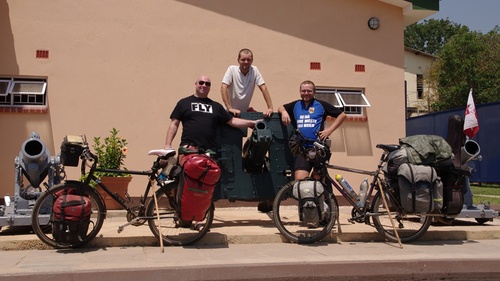
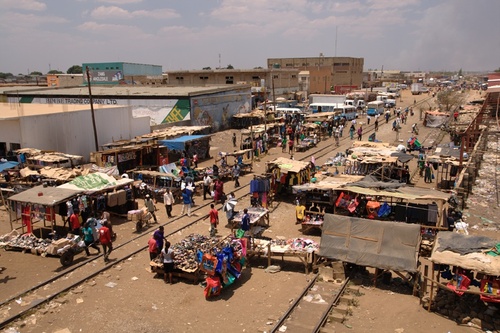
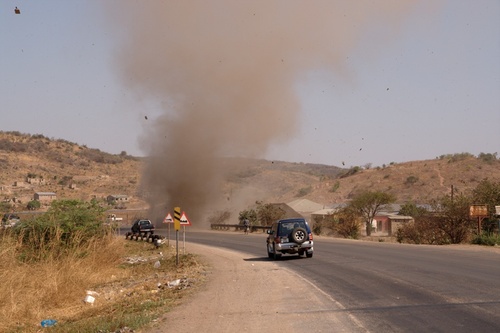
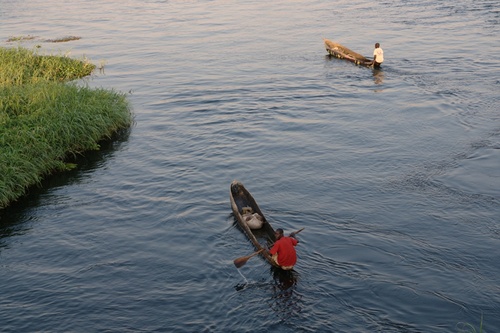
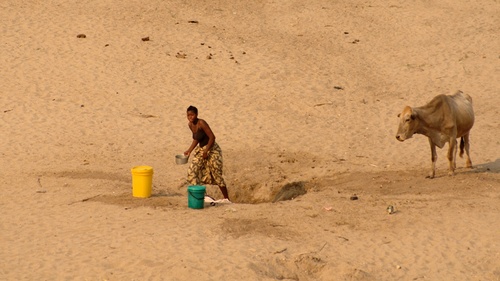
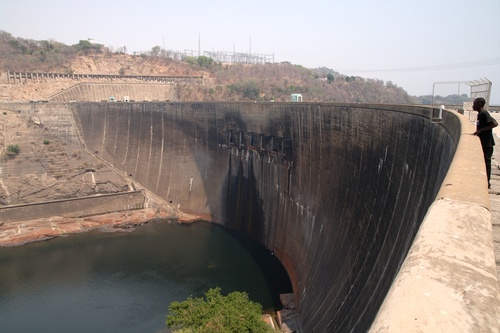
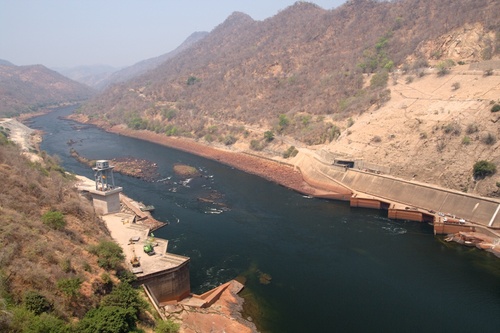
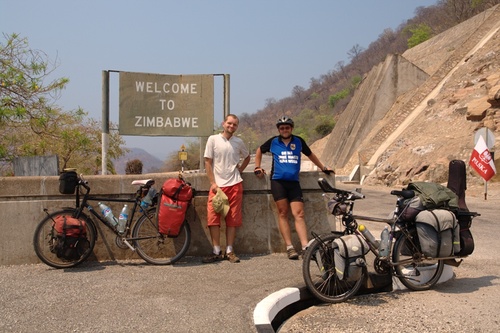
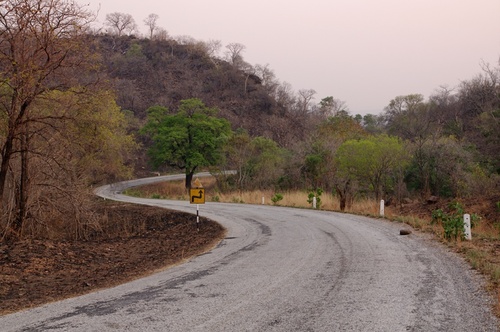
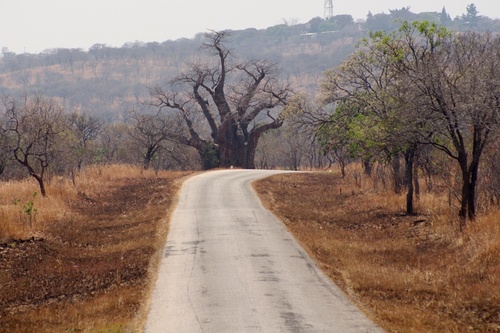
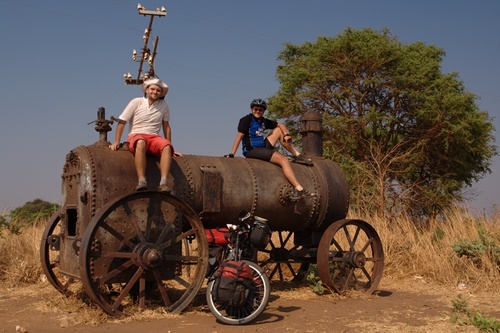
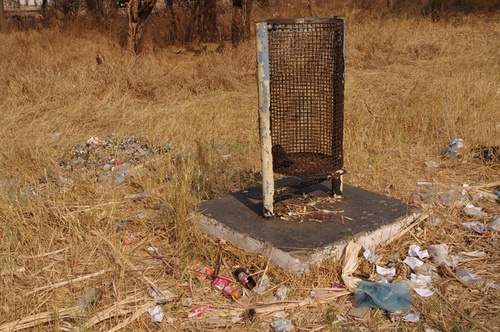
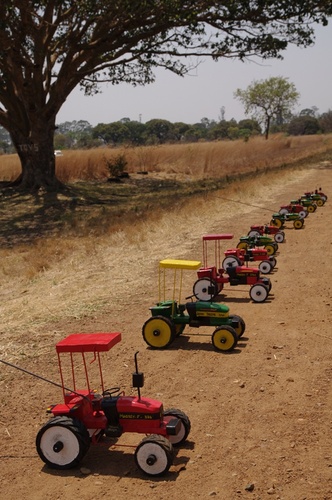
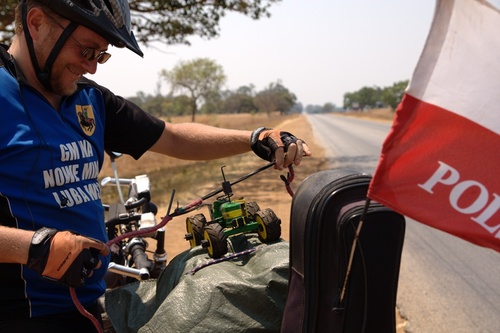
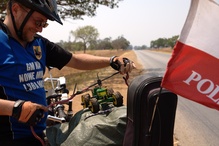

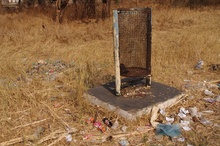
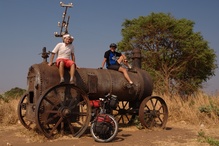
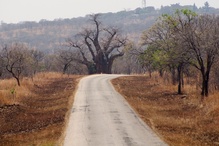
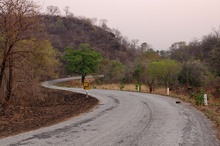
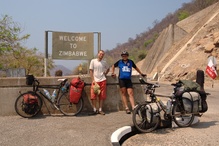
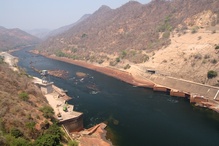
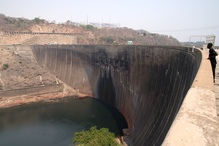
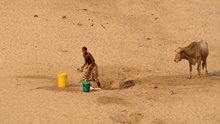
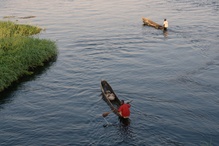
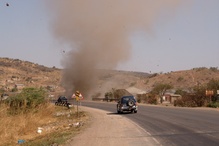
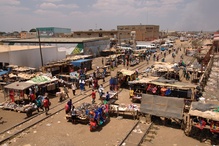
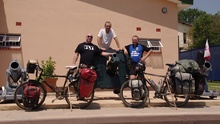
Comments:
mama
Iwo
donosiciel
Sorrry Panowie :)
Wojtek
Powodzenia i jeszcze przyjemniejszych przygód!
Pataty i Pomarańcze
Trochę szkoda przepięknej Namibii, co?
Pamiętam, że Peter się zachwycał, no ale on chyba nie był tam latem, bo na zdjęciach był w czapce ;)
Powodzenia w dalszej drodze chłopaki!
Chłodu i wiatru w plecy!
Pozdrawiamy ze śnieżnego już Wrocławia.
Aga i Adam